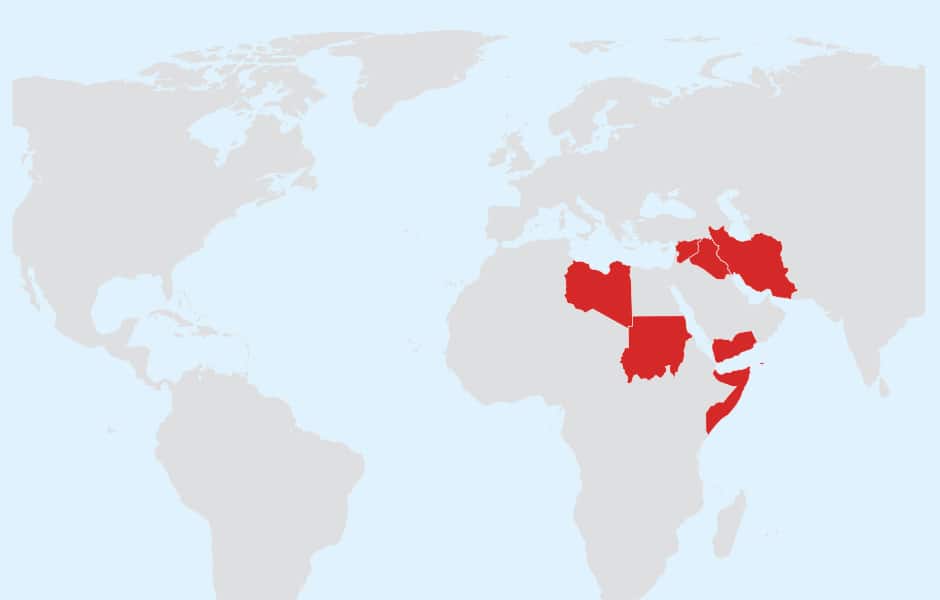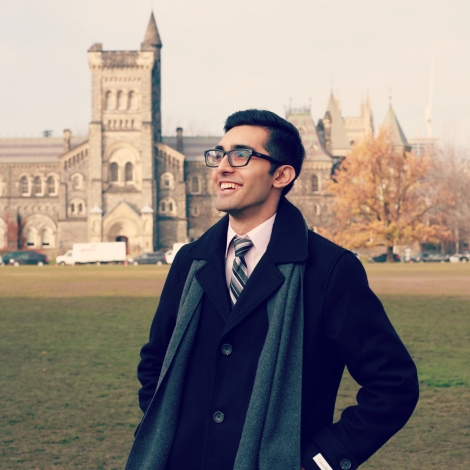U of T students are reeling from the effects of President Donald Trump’s recent executive order on immigration. The order — signed last Friday at 4:42 pm — suspends entry for Syrian refugees indefinitely, bans all refugees for 120 days, and bars citizens of the following six Muslim-majority countries for 90 days: Iran, Iraq, Libya, Somalia, Sudan, and Yemen.
The executive order echoes the Islamophobic proclamations made by Trump during the recent election campaign that he would ban Muslims from entering the United States — and begins to put them into action.
The order came in the wake of increased reports of violence against Muslims in the US and around the world, including Canada. On Sunday at approximately 8:00 pm, a little over 48 hours after the executive order was signed, at least two gunmen opened fired in a Québec City mosque, leading to the deaths of at least five people.
Members of the U of T community and their families are among those who have been affected by the order.
Trinity College Female Head of Non-Resident Affairs Joudy Sarraj would have been affected by the ban were it not for the exemption given to Canadian citizens. Sarraj has dual citizenship in Syria — where she was born — and Canada.
Additionally, Sarraj says that a majority of her family members “are refugees, displaced in various parts of the world.”
Sarraj said that “the few hours of immense sadness and disbelief experienced by dual Citizens, told that their right to mobility would be violated in a way they had never before imagined, is something we ought not forget.”
Sarraj also noted that potential summer employment opportunities “would have been derailed” if she were affected.
“I see no reason why I can be sure that my rights will be absolutely protected, why every opportunity will be afforded to me, and why I am not considered a security threat,” Sarraj continued. “This is truly a life-long restriction for those in protracted displacement, and yet, little differentiates us.”
A Brooklyn federal judge blocked part of the executive order on Saturday night, effectively preventing the deportation of some refugees and immigrants who were affected by the ban and trapped inside airports. Since then, federal judges from Washington, Virginia, and Massachusetts have also issued rulings to block the order.
Also on Saturday night, a top Trump advisor informed the Canadian government that Canadian citizens who hold a dual citizenship with one of the seven affected countries and permanent residents will still be permitted to enter the United States. On Sunday afternoon, Canadian Immigration Minister Ahmed Hussen confirmed this.
On Sunday morning, White House Chief of Staff Reince Priebus reversed a portion of the order: green card holders from the affected seven countries would in fact be able to return to the United States. Previously, green card holders would have been barred.
Amin Sharifi is a fourth-year Commerce student pursuing a second undergraduate degree. Sharifi immigrated to Canada about a decade ago and has dual citizenship in Canada and Iran.
Sharifi says he and his family are “sort of in limbo” — unsure of whether or not they would be allowed to enter into the United States.
“It creates a distrust in the US for me,” Sharifi said. “Do these people have it out for me? Are they profiling me or putting me on some watchlist because I’m from this country? Yes, that’s what they’re doing.”
Sharifi also mentioned that he was in the United States last December for a hackathon and has been to the country many times.
“[The executive order is] a very hostile action, in every way, shape, and form. It’s an attack on your nationality, it’s an attack on your religion — it’s discrimination,” Sharifi said.
Sharifi lived for two years in the Sainte-Foy neighbourhood in Québec, where Sunday’s shooting took place.
He told The Varsity, “Shock and disgust were my immediate reactions, especially having lived in exactly the same spot in Quebec when I was 10 to 12.”
“I wouldn’t say I feel less safe in Canada, per se, but I definitely am more cautious about being optimistic about Canada not having the same prejudices and racist overtones that are existent in the US,” he continued. “I definitely perceive Canada as more racist than I thought it to be, if such a thing happens here as well — a shooting at a mosque during prayer time.”
Second-year Physics and Math student Nikki Rahnamaei also feared the implications for her and her family. Rahnamaei has Irani-Canadian dual nationality and has grown up in Canada.
When asked how the travel ban affects her perception of the United States she said, “It definitely has affected my willingness to ever go to the States, even to visit.”
Rahnamaei also mentioned potential jobs and internships but said that she didn’t “want to go somewhere where there’s going to be a hostile environment towards [her] and [her] individuality.”
“Although I’m born and raised in Canada, I’d still like to maintain my cultural heritage,” she explained.
With regards to the Canadian government’s response, Rahnamaei is pleased that the Trudeau administration has ensured that the ban does not affect Canadian citizens and that the country is still accepting refugees.
Nazanin Zarepour, second-year student studying Political Science and Near and Middle Eastern Civilizations, is also an Iranian-Canadian dual citizen born in Canada. Zarepour said the United States “generally feels like somewhere unsafe.”
When asked how the ban has affected her, Zarepour said that, “Emotionally, it’s really sad. You kind of feel like the ‘other.’”
Zarepour mentioned that she has both friends and family in the US and visits frequently.
Commenting on the executive order in particular, Zarepour said that “it made it more legitimate — how much they hate my background. Before it was more indirect, but this is very direct, and it’s legal, so it makes it completely different. It makes everything set in stone.”
Zarepour continued, “Before Trump, the sentiment was there, and now it’s legitimized.”
With files from Jacob Lorinc
Editor’s note (2021): This ban is no longer in effect. When it was in effect, all dual citizens who held citizenship in a country not affected by the ban, like Canada, were exempt from it.




